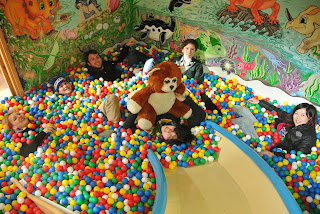”I'm trying to get up
that great big hill of hope” Remembering the echo of our last nights’
singing of the 4 Non Blondes’ “What’s Up?”, on May 29th 2015, I feel driven to find out what the
Sámi's are missing here in Finnish society. From my own perspective, I have
always considered the Sámi people important for allowing Finnish people to
settle peacefully on this continent. However, during this excursion to Kevo I have begun to reflect on our culture
on a more global level.
”What's going on”
For recognizing the issues of indigenous people here in Finland, and
Scandinavia in general, we had the possibility to hear about the work of the
Sámi parliament. Suddenly, it
became clear that although the Sámi are mentioned in the Finnish constitution (1086/2003), Sámi's are
struggling to sustain their cultural identity in their own homeland because of
the colonizers’ governance, politics, and control over natural resources. For
example, there are around 10,000
Sámi people living in Finland, however, 70% of Sámi youngsters nowadays live
outside of the Sámi Home Region due to the fact that they have to move far away
to get an education. On matters
concerning the Sámi as indigenous people, the Finnish government has an
obligation to consult Sámi’s and the Sámi Parliament, however
this rarely has any influence on governmental decisions. In 2007, the
UN-countries accepted the ILO-declaration No.169,
however the Finnish parliament hasn't been able to legally ratify it yet.
Overall, Sámi’s are being marginalized even though their rights are
acknowledged in the constitution.
I was very surprised by
their holistic approach to their identification, which is one of the key
elements of being officially recognized as an indigenous person. Their identity
as a divergent people manifests itself in the traditions of their language, art
and professions which are the vital links into their culture and
self-understanding. I am also impressed by their unanimous cultural strength in
protecting their wellbeing. Although individually it is a continuous
work for making a living in Lapland, they are able to keep on living strong as
a whole community. That is something to learn from in this lonely and
individual-based western society. While their lands are being used
unsustainably for profit by colonizers, it’s becoming a necessity for the
preservation of the Sámi culture to actively promote the preservation of the
Sámi languages, despite their residence outside Sámi Homeland. Because of our
history together with the Sámi people, one could even debate we owe it to
them to give better support to for example keeping the Sámi language alive,
than we currently are. If you are interested to share the experience, please visit Sida.
What about my own
self-understanding? Because of the people I met, my self-understanding as a
social worker focuses more on being courageous and cherishing of people. I am
grateful for all of you, who made it possible to learn, about different
discourses and solutions to social issues in your homeland. I almost feel
overwhelmed by this opportunity for broadening my horizons the International Summer School 2015 gave me.
”And I say Hey!”
Thank you each and every one of you. And, while feeling a little blue, it is
time for farewells. Cherish hope! Be courageous Social Workers! I miss you all.
Heidi Hellsten, University of Lapland, Finland







